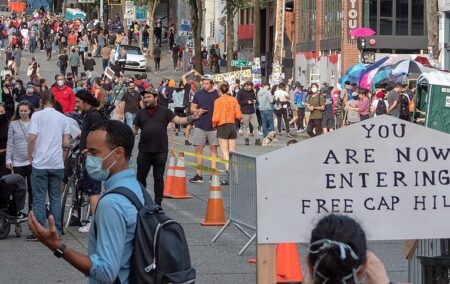From the grubby streets of the Capitol Hill Occupy Protest (CHOP) to the swish, champagne-fueled parties of the EFF and their ecosystem of woker-than-thou activists and national socialists[i], the call has been growing with ever greater strength and forcefulness.
It sounds something like this: property rights (i.e. capitalism) are tied to racial injustice, and in order to achieve racial justice we must dismantle capitalism.
The argument supporting this idea is roughly as follows: In a system of systemic, systematised injustice along racial lines, property rights are a bastion of white power and privilege. By protecting the rights to hold and protect property, the capitalist state exercises power on behalf of the land holders and the powerful by using its police and army to evict the poor and marginalised from their homes. By simply abolishing property rights, the righteous acolytes of progress will rip the capitalists from their decadent nests. The wisest sages of the revolution will then redistribute property to those it deems most deserving.
Unfortunately, those wisest sages are very often also the new oligarchic elites of these socialist utopias, who in most cases will put the oppressors they have replaced to shame with their own greed and brutality.
That an oligarchic elite is an inevitability of any system was an idea put forward by German sociologist Robert Michels[ii] in The Iron Law of Oligarchy, which is well described by Wikipedia:
The theory states that all complex organisations, regardless of how democratic they are when started, eventually develop into oligarchies. Michels observed that since no sufficiently large and complex organisation can function purely as a direct democracy, power within an organization will always get delegated to individuals within that group, elected or otherwise.
Manipulating the system
So, no matter how pure your revolution, it is inevitable that an elite will emerge that specialises in running whatever organisation you have. This elite will be expert in manipulating the system towards its own benefit.
What does this mean for property rights?
Well, consider for a minute the difference between a system of property ownership in a free market, and the kind proposed by the racial socialists of the Economic Freedom Fighters (EFF) and the woke protesters of CHOP.
Which system is more likely to curb the power of an oligarchy?
Would it be one that centralises power in the hands of officials or ‘community leaders’ who decide about ownership based on ‘the common good’, or one that decentralises the process into the hands of individuals trading between themselves, and which protects all legal holders of property equally whether they are politically connected or not?
For some concrete examples of how the world looks without property rights, especially as they relate to poor black people, we need look no further than at the many South Africans who suffer from a lack of property rights.
Consider for a moment a hypothetical poor black woman who lives in rural KwaZulu-Natal and wants to farm some land. Maybe she got good marks at school and, with a scholarship, studied agriculture at university. Which system of property relations is she more likely to prosper in? Would it be one in which her access to land is determined by a ‘traditional leader’ who possibly demands a bribe she cannot afford, one where access to land is determined by the local party chairman who grants land rights only in exchange for sexual favours or vote loyalty, or one in which her ownership and access to land is protected so long as she paid for it?
Protected from arbitrary seizure
A system of ownership in which she can negotiate to buy land which is then hers to leverage in exchange for capital would give her land she could invest in and develop to improve life for herself and the people she supports. Moreover, this would be land protected from arbitrary seizure and which she could give to her children, or sell.
Property rights help the politically unconnected and protect the vulnerable – the groups the anti-capitalism crowd claims to care about – from being abused. Without a guarantee of property rights for all, groups already entrenched in powerful positions can use their political or social power to guard their own property rights, while those without access to power are left without any recourse, should the land they work or live on be stolen from them.
The allegedly pro-black EFF and African National Congress, which are pro-black in the same way that a vulture is pro-springbok, understand these dynamics all too well. They understand that there is no better way to enhance their power over society than to remove property rights and make the very communities they claim to represent subject to their will.
If you want to protect the marginalized and the downtrodden from abuse, then you should support property rights, or face a future kneeling before oligarchs drunk with unchecked power.
[Picture: Alex Glidewell, https://en.m.wikipedia.org/wiki/File:Entering_Free_Capitol_Hill.jpg]
If you like what you have just read, subscribe to the Daily Friend
[i] I wish we had a handy abbreviation for this, though NAZI could work
[ii] When Michels formulated his theory, he was an anarcho-syndicalist. He later became an important ideologue of Benito Mussolini’s fascist regime in Italy. Despite his insightful critique of anarcho-syndicalism, he was unable to see the solutions to his problems which liberal democracy provides, and gave up on democracy entirely.

